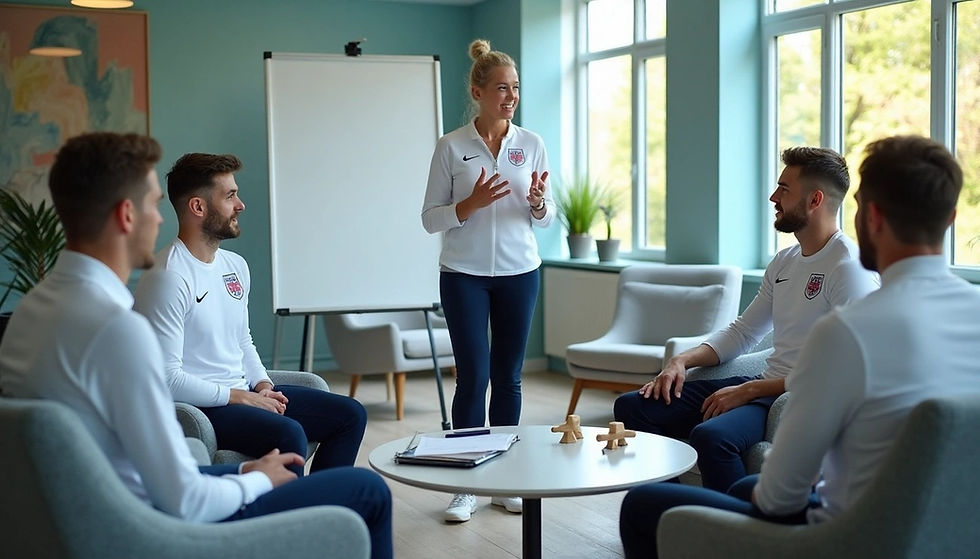The Hidden Psychology in Football: Inside England's Mental Training Room
- Dr Paul McCarthy

- Aug 6, 2025
- 12 min read

Psychology in football has evolved from a specialized field to become essential in elite team preparation. Top football clubs now employ sport and exercise psychologists because mental training matters just as much as physical conditioning. England's national team proves this point perfectly - their mental game transformation helped them exceed expectations in recent tournaments.
Football psychology's rise to prominence shows clearly through key appointments. Dr. Kate Hays stepped into the role of England Football's head of women's performance psychology after spending seven years with the English Institute of Sport. Her impact at EIS led to the psychology team growing by a lot - from 15 to 30 specialists. The FA made another bold move by bringing in Pippa Grange as head of people and team development in 2018. This showed their steadfast dedication to tackle psychological pressures that troubled previous England squads. This focus on sports psychology reaches beyond professional teams. Young players in academies now receive psychological support, which helps the roughly 11,000 players who face release each year.
The shift in England’s football mindset
England's national football team has gone through an amazing psychological change in the last few years. The heavy expectations that used to crush promising teams have changed into something completely different - a foundation that builds achievement and growth.
From fear to freedom: a new team identity
English players used to step onto the international stage filled with dread. The Three Lions on their shirts felt more like a burden than pride. Star players who shined at their clubs suddenly looked nervous and restricted while playing for their country.
This mental block showed up most clearly during penalty shootouts - England's biggest weakness. The team lost six out of seven penalty shootouts in major tournaments between 1990 and 2018. This became so common that fans and players developed what psychologists call "learned helplessness" - they believed failure would happen no matter what.
Everything changed after the embarrassing Euro 2016 loss to Iceland. This defeat made everyone rethink how the team worked. The Football Association realized that mental strength was just as important as technical skills.
Players learned to "control the controllables." The team saw pressure as a chance to grow instead of a threat. The squad built real connections between teammates and broke down walls between players from rival clubs to create one united team.
On top of that, players started being more open. They moved away from the old "stiff upper lip" attitude that kept emotions hidden. Players now talked about their fears and problems openly, which made everyone feel safer.
How Gareth Southgate embraced mental training
Gareth Southgate became England manager in 2016, and this changed everything. He knew exactly what players felt because he had missed a vital penalty at Euro '96. This gave him a special understanding of the team's mental challenges.
While other managers avoided talking about past losses, Southgate faced them head-on. He talked about his penalty miss and what he learned. This helped players see that failure wasn't something to hide.
Southgate brought in new ways to train mentally. Players practiced penalties under match-like pressure, which helped them create routines they could trust in big moments. This paid off when England finally won a penalty shootout against Colombia in the 2018 World Cup.
The manager made sure players felt valued as people, not just footballers. He supported their interests outside football and let them speak up about social issues they cared about. This integrated approach helped reduce stress by giving players a broader outlook on life.
Southgate also brought modern psychology into football. He used visualization, mindfulness, and personal psychological profiles. Each player got mental training that matched their personality and needs.
The proof is in the results. England reached their first major tournament semi-final in 28 years at the 2018 World Cup and made their first final in 55 years at Euro 2020. This change from fearful underachievement to confident performance shows what happens when you take care of the mental side of elite sport.
Pippa Grange and the rise of football psychology
A culture coach with a unique take on sports psychology played a crucial role in England's football revival. Dr. Pippa Grange joined as the Football Association's Head of People and Team Development in November 2017. Her appointment brought a new way of handling mental performance at English football's highest levels.
Who is Pippa Grange?
Yorkshire-born and a self-proclaimed Arsenal fan, Dr. Pippa Grange's journey started at Loughborough University where she earned her sports science degree. She played in England's National Basketball League before moving to Australia in 1996 [1]. She earned her doctorate in psychology there and made a name for herself as a "culture performance coach." Her work spread to rugby teams in New Zealand and the Australian Football League's player association [1].
She sees herself more as a culture coach than just a psychologist. "I'm a psychologist by trade but I think of myself as a culture coach," she explains [2]. Two main ideas shape her approach: "excellence can be found anywhere" and "love is definitely stronger than fear when it comes to performance" [2].
Dr. Grange runs her own consultancy called Bluestone Edge [3]. She wrote "Fear Less," a book that looks at perfectionism, anxiety, and the downsides of living with "clenched fists rather than open hearts" [4].
Her role in reshaping the scene of England's team culture
The FA brought Grange on board in 2017 with a clear goal: build tournament resilience and boost the mental fortitude that England teams had struggled with [5]. She worked from St. George's Park National Football Center with all men's and women's England squads [5].
During her 20-month stint with the FA, she put several key strategies in place for the senior men's team. England's Eric Dier shared: "I think a lot of the work that we've done with her has been prior to the tournament starting, over the last six or seven months" [1]. Players opened up about their lives and worries in small group sessions. They shared personal truths about what drives them [1].
She got players to put down their phones and take part in team activities. The famous inflatable unicorn pool games during the 2018 World Cup caught everyone's attention [1]. She didn't ban social media but promoted mindful usage.
Her biggest impact came from helping players see failure differently. "I'd like to turn this unhealthy preoccupation with success on its head and put it on the record that I think failure is really useful. For without failure we cannot progress longer, higher or faster," she writes [1].
Why psychological safety matters in elite sport
Modern sports psychology, especially in football, puts great emphasis on psychological safety. Players need an environment where they can take risks, speak up, ask questions, be themselves, and own up to mistakes without fear [6].
Elite sports thrive on competition, yet psychological safety remains key to lasting success. Research shows that psychological safety helps people learn by asking for help and allowing mistakes. It lets them speak openly even with power differences and challenge ideas freely [7].
Football's old win-at-all-costs mindset often created unsafe environments. Physical and psychological harm became normal in a culture of silence [7]. Teams with psychological safety show better results:
Boosted communication between coaches and athletes
Greater trust and respect within teams
Improved commitment and cooperation
Better individual performances and team dynamics [8]
Creating psychological safety doesn't mean removing competition or pressure. Players need emotional foundations to handle pressure well. One expert puts it nicely: "Toughness is like a block of concrete, it's immovable, it's hard, whereas resilience is more like a sheet of flexible steel and it's got give in it" [2].
Grange's approach to football psychology ended up showing that consistent winning needs genuine relationships built on care and authenticity. "If you know people are in the trenches with you, genuinely, then there's a sense of safety created by that, a sense of home, a sense of belonging, that's very comforting for people" [2].
Inside the mental training room
The England team's mental training room serves as a sophisticated psychological workshop. Players develop elite performance through evidence-based psychological techniques that go beyond tactical discussions and physical conditioning.
Group bonding and vulnerability exercises
Team building activities make teams more effective [9]. England's psychological team helps players create genuine connections. Players share personal experiences and anxieties in small groups. These trust-building exercises help break down barriers between club rivals and build a collective identity.
Professor Dave Collins has worked with 80 world and Olympic champions. He believes effective teams need a "shared mental model." This model helps everyone understand team goals and their roles [10]. Players who share this understanding protect themselves better against criticism and early performance issues.
Reframing pressure as chance
England players learn to attach positive meanings to challenging situations through cognitive reframing. They see high-pressure moments as challenges instead of threats [11]. This mental move changes how their bodies respond. Anxiety becomes performance-enhancing rather than performance-hindering.
Experts say we can choose what meaning we give to situations rather than let circumstances control our thinking [12]. Players work on content reframes to change situation meanings. They also practice context reframes to spot behaviors that help in some situations but not others.
Visualization and mental rehearsal techniques
The players keep using mental imagery to prepare for games. This method activates neural pathways like physical practice does. Players can train their brains without physical effort [13]. They picture everything from specific skills to handling tough away crowds.
Mental imagery builds stronger neural connections for desired movements. This improves motor skills, decision-making, and pressure handling [14]. Players learn to expect different game situations. They make quick decisions and stay calm when it matters most.
The role of routines in high-pressure moments
Players need stable routines during chaotic moments. These consistent sequences create a sense of control. Players use physical warm-ups, visualization exercises, and specific mental cues [15].
Research from ten studies shows these pre-game routines help athletes perform better under pressure [16]. Players feel calmer in tough situations and execute skills more consistently. On top of that, these routines let players use other mental skills like positive self-talk. This helps them block out distractions at crucial moments.
The science behind the strategy
The science behind football psychology shows fascinating links between mental training and improved performance. Research proves how the right psychological methods lead to better results on the pitch.
How sports psychology in football works
Professional football psychologists face four big challenges: they must stay authentic, handle multiple relationships, work within elite sport cultures, and survive in these tough environments [17]. They need to show clear results to prove their worth. This explains why some coaches still doubt the value of psychologists - it's hard to gather solid data about their impact [17].
New studies show that mindfulness training helps build resilience, self-confidence, and emotion control - key traits for top athletes [18]. Brain Endurance Training (BET) has proven quite effective by mixing mentally tiring cognitive tasks with physical training. A study revealed that pro players who got BET improved their passing, shooting, and thinking skills by a lot when mentally tired. Players who didn't get this training showed no improvement [19].
The importance of shared purpose and clarity
Shared mental models are the foundations of good team coordination. These models, which are "overlapping mental representations of knowledge by team members," help players predict what their teammates will do [20]. This leads to smoother movements during matches.
Teams perform better when their members think alike in specific situations - research backs this up [21]. This shared understanding takes time to build through:
Practice time together
Team drills in controlled settings
Good communication methods
Building relationships off the field
The coach's job is to create chances for players to understand each other's roles and likely moves. This improves how well they work together [21].
Lessons from Olympic and Paralympic teams
Football now uses psychological techniques that Olympic athletes pioneered. A sports psychologist points out: "Premier League footballers started building their own personal teams... this gives players stability even as they move between clubs. It's just like the Olympic model" [22].
Olympic athletes follow specific pre-competition routines with strategic stretching, mental prep exercises, and careful meal timing [23]. They also use techniques like "stotting" - showing fitness through exaggerated movements - and keeping poker faces before competing to gain a mental edge over opponents [24].
What we can learn from England’s approach
The lessons from England's football psychology reach beyond the pitch. These mental strategies are a great way to learn about handling challenges in personal or professional lives.
Applying football psychology to everyday life
Footballers learn to control their minds under pressure, and we can use these techniques to manage daily stressors. Players use visualization to mentally rehearse successful outcomes—a technique that works well for job interviews, presentations, or difficult conversations. A player's pre-performance routines during penalty kicks can become personal morning rituals that center us before big days.
The value of failure and emotional resilience
England's team development started when they embraced vulnerability instead of fearing it. This move shows us that setbacks don't permanently define our abilities but create opportunities for growth. Reframing failures as feedback helps build emotional resilience and the ability to recover from disappointments. England's penalty shootout practice proves that facing our fears head-on reduces their control over us.
Why kindness and trust outperform fear
England's approach teaches us that psychological safety works better than intimidation. Southgate's environment valued people first and performers second, which naturally improved their performance. This principle works everywhere—in families, workplaces, and communities. Trust and compassion create better results than fear and judgment.

Conclusion
Football psychology has definitely progressed from an afterthought to become the life-blood of team preparation at all levels. England's transformation under Gareth Southgate proves that focusing on performance's mental aspects creates real results on the pitch. Their experience from penalty shootout failures to tournament contenders shows how teams can overcome psychological barriers through focused mental training.
England's approach stands out because they adopt vulnerability and psychological safety. The team found that there was a natural boost in performance when players felt valued as people first and performers second. Scientific evidence backs this up - techniques like visualization, reframing pressure, and establishing routines substantially improve decision-making and skill execution under pressure.
The most powerful lesson from England's psychological revolution reaches way beyond the reach and influence of football. Their soaring win reminds us that environments built on trust and compassion perform better than those driven by fear and judgment. Psychological safety creates the foundation to achieve individual growth and collective success at work, home, and in sports.
England's story teaches us that mental strength doesn't come from suppressing emotions or keeping a stoic facade. It grows when we acknowledge vulnerabilities, reframe challenges as opportunities, and encourage genuine human connections. The hidden psychology in football ended up revealing a universal truth - our minds, when trained properly, can turn seemingly insurmountable obstacles into stepping stones toward success.
Key Takeaways
England's football transformation reveals how mental training can unlock peak performance by addressing psychological barriers that technical skills alone cannot overcome.
• Psychological safety beats fear-based coaching - Teams perform better when players feel valued as people first, creating trust that enhances rather than inhibits performance under pressure.
• Reframe pressure as opportunity, not threat - Mental training helps athletes view high-stakes moments as challenges to embrace rather than obstacles to fear, fundamentally changing physiological responses.
• Vulnerability builds team strength - Encouraging players to share fears and failures openly creates genuine connections and collective resilience that withstand external criticism.
• Pre-performance routines provide stability in chaos - Consistent mental and physical preparation sequences help maintain composure and skill execution during crucial moments.
• Mental skills transfer beyond sports - Visualization, emotional resilience, and reframing techniques from elite football psychology can enhance performance in everyday personal and professional challenges.
The science confirms what England discovered: addressing the mind is just as crucial as training the body, and environments built on compassion consistently outperform those driven by intimidation.
FAQs
Q1. How has England's football team transformed psychologically in recent years? England's team has shifted from a fear-based mindset to one of freedom and resilience. They've embraced vulnerability, reframed pressure as opportunity, and fostered genuine connections among players, resulting in improved performance in major tournaments.
Q2. What role does psychological safety play in elite football? Psychological safety is crucial in elite football as it allows players to take risks, express ideas, and acknowledge mistakes without fear. This environment promotes better communication, trust, and cooperation within the team, ultimately leading to enhanced individual and collective performance.
Q3. How do visualization techniques benefit football players? Visualization helps players mentally rehearse game scenarios, enhancing decision-making and performance under pressure. It activates similar neural pathways as physical practice, strengthening connections associated with desired movements and improving overall skill execution.
Q4. What is the importance of pre-performance routines in football? Pre-performance routines provide players with a sense of stability and control in high-pressure situations. These consistent sequences help reduce arousal, ensure consistency in skill execution, and provide opportunities to implement mental skills like positive self-talk.
Q5. How can football psychology techniques be applied to everyday life? Many football psychology techniques can be adapted for personal and professional challenges. Visualization can help prepare for important events, reframing can change how we perceive obstacles, and developing emotional resilience can help us bounce back from setbacks in various aspects of life.
References
[1] - https://www.theguardian.com/football/2018/jul/10/psychology-england-football-team-change-your-life-pippa-grange[2] - https://archive.trainingground.guru/articles/pippa-grange-working-on-the-soul-of-the-team[3] - https://en.wikipedia.org/wiki/Pippa_Grange[4] - https://brenebrown.com/articles/2021/07/22/what-ive-learned-from-the-work-of-dr-pippa-grange/[5] - https://www.thefa.com/news/2019/jul/24/dr-pippa-grange-to-leave-fa-240719[6] - https://thecpsu.org.uk/resource-library/publications/creating-a-psychologically-safe-culture/[7] - https://pmc.ncbi.nlm.nih.gov/articles/PMC10978613/[8] - https://www.sciencedirect.com/science/article/pii/S146902922200231X[9] - https://www.sciencedirect.com/science/article/abs/pii/S2352250X16301580[10] - https://www.theguardian.com/football/article/2024/jul/13/gareth-southgates-authenticity-helps-englands-mental-preparation[11] - https://www.thepracticeat322.co.uk/blog/five-sport-psychology-techniques-England-football-team[12] - https://athletetough.com/reframing-affects-results-what-you-need-to-know-in-sport/[13] - https://www.performancepsychologycenter.com/post/visualization-techniques-and-mental-imagery[14] - https://www.isspf.com/articles/mental-imagery-in-football/[15] - https://www.linkedin.com/pulse/mind-over-matter-ten-strategies-england-enhance-game-gareth-kmnbe[16] - https://www.tandfonline.com/doi/full/10.1080/1750984X.2024.2414442[17] - https://www.frontiersin.org/journals/psychology/articles/10.3389/fpsyg.2024.1428892/full[18] - https://www.sciencedirect.com/science/article/pii/S2667239122000296[19] - https://www.sciencedirect.com/science/article/pii/S1440244024004882[20] - https://www.frontiersin.org/journals/sports-and-active-living/articles/10.3389/fspor.2023.1057143/full[21] - https://www.tandfonline.com/doi/full/10.1080/14660970.2022.2161527[22] - https://www.bps.org.uk/psychologist/football-adopting-olympic-model[23] - https://www.drpaulmccarthy.com/post/what-does-a-sports-psychologist-do-an-inside-look-from-olympic-team-experts[24] - https://www.theguardian.com/sport/article/2024/jul/26/olympic-mind-games-10-ways-athletes-try-to-gain-a-psychological-edge



